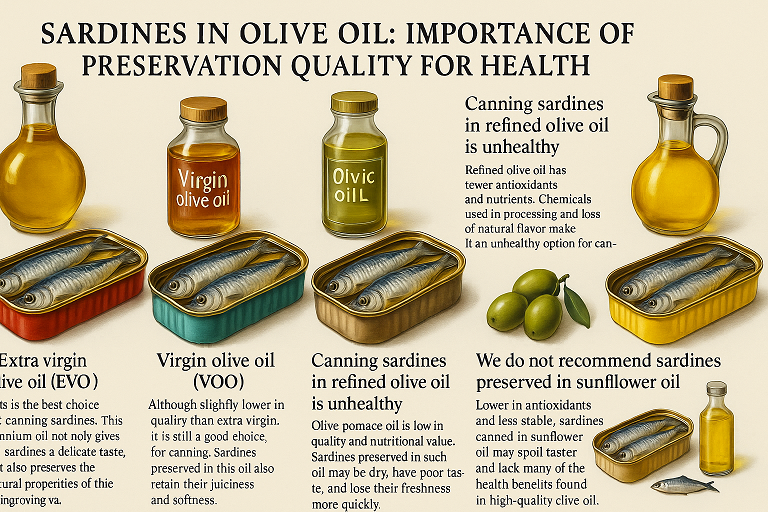
Types of Portuguese canned sardines
Portuguese sardines can be preserved with tomatoes, lemon, peppers, chili or bay leaves, giving them various aftertastes, but never losing the freshness and essence of the main product. S ardine is one of the most famous symbols of this country's cuisine. Due to its high quality, unique taste and long preservation traditions, these fish have become popular all over the world.
The most popular types of sardines in Portugal
There are many different types of sardines in Portugal, which differ in their taste characteristics and preparation methods. Sardines can be preserved in olive oil, tomato sauce, garlic, lemon juice or traditional Escabeche marinade . Each type has a unique taste and is used in different traditional dishes. Due to their variety of taste, Portuguese sardines have become a great choice not only in Portugal, but also in international cuisine.
Sardines preserved in olive oil: taste and tradition
Olive oil is an excellent natural preservative that not only helps preserve sardines, but also gives them a deep, rich flavor. Sardines preserved in olive oil are considered one of the classic dishes of Portuguese cuisine. The oil helps keep the sardines juiciness and softness, while enriching their taste with the natural aromas of olive oil.
Sardines in tomato sauce: sweet and sour taste
Canned sardines in tomato sauce are a great choice for those who like a rich, sweet and sour taste. The tomato sauce not only gives the sardines a nice texture, but also perfectly complements their natural taste. In Portugal, these sardines are often used in sandwiches or served with fresh bread as a light snack.
Garlic flavor in sardines: culinary possibilities
Sardines with garlic are a great choice for those looking for a more intense flavor. Garlic perfectly complements the natural taste of sardines and gives them spiciness. These sardines are often used in traditional Portuguese dishes such as sardine stews or tapas. By enriching them with olive oil and fresh herbs, it is possible to create exceptional culinary masterpieces.
Spicy sardines: a savory flavor in Portuguese cuisine
Spicy sardines are loved for their intense, savory flavor. They are a great choice for those who like spicier dishes. Spicy sardines are mostly used as snacks, but they are also great for cooking various stews or pasta. This product is especially popular among people who appreciate an expressive, intense taste.
Lemon flavored sardines: freshness and freshness
Lemon juice gives the sardines freshness and a subtle, light acidity that perfectly balances their flavor. Sardines with natural lemons are often used as a light snack or a main course together with a fresh salad. The lemon juice from the preserved lemon slice not only improves the taste, but also helps preserve the freshness of the fish.
Sardines: Portuguese Culinary Heritage
Sardines are an integral part of Portuguese cuisine. These fish are often used in celebrations, such as the traditional feast of San Pedro, where they are grilled and served with bread and wine. In Portugal, sardines symbolize not only sea culture, but also the nation's love for simple, but extremely tasty and useful dishes.
Preservation technologies for sardines in Portugal: preservation of fish quality
In Portugal, sardine preservation technologies have been developed for many decades. Traditional methods, such as canning in olive oil, are combined with modern innovations to maintain the highest quality of the fish and the longevity of the preserves. Thanks to these technologies, Portuguese sardines remain fresh, tasty and nutritious for a long time.
Why choose Portuguese sardines?
Portuguese sardines are distinguished by their taste, quality and traditions from products produced in other countries. The variety, from preserved in olive oil to spicy, gives every taster the opportunity to discover his favorite taste.
Include Portuguese sardines in your daily menu and enjoy not only delicious food, but also healthy and nutritious properties!




Leave a comment
This site is protected by hCaptcha and the hCaptcha Privacy Policy and Terms of Service apply.